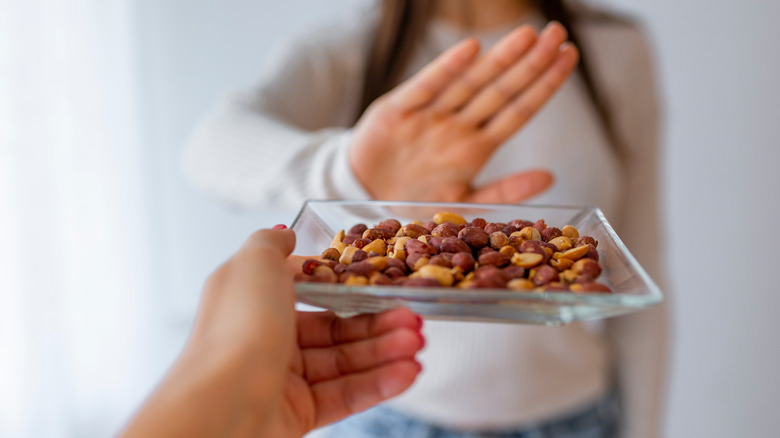What Is A Lectin-Free Diet And Should You Try It?
Lectins, or hemagglutinins, are proteins found in many foods and all plant sources. They appear in large amounts in whole grains, lentils, beans, soybeans, peanuts, and peas (via MedicineNet). Lectins have antioxidant properties that help protect cells from free-radical damage. They aid in digestion because they help slow the process. This can help prevent spikes in sugar and insulin, per Harvard Public Health. There are many types of lectins, and some are even considered to be harmless (via WebMD).
When some lectins are consumed — especially raw — they can bind to carbohydrates, making digestion difficult. WebMD points out that raw kidney beans, raw potatoes, peanuts, and whole grains seem to be more dangerous — or at least more likely to cause sensitivity — when eaten raw. Because of this, people who are sensitive to lectins may experience nausea, vomiting, an upset stomach, gas, and bloating after eating them (via Harvard Public Health).
Not all lectins are created equal
Some theories suggest that because lectins cause digestive issues, they might be the culprit behind some inflammatory conditions. This may be especially relevant if lectin-containing foods are consumed in large amounts, reports Mayo Clinic. In addition, Medicine Net reports that people with irritable bowel syndrome (IBS) might be more sensitive to lectins. In addition, some animal and cell research indicates that lectins might prevent your body from absorbing some nutrients, and this could be a factor in developing inflammatory conditions, per Harvard Public Health). But not all lectins are created equal, and some are safer than others, according to WebMD.
This information has caused some people to embark on a lectin-free diet to see if it eases their symptoms (via Harvard Public Health). A lectin-free diet eliminates foods with high concentrations of lectins, such as peanuts, beans, lentils, whole grains, potatoes, and some fruits.
More research is needed
Most foods that contain lectins are considered part of a healthy diet, and this fact has many experts wondering if they should be avoided by people who don't have any discomfort or other symptoms. Christen Cupples Cooper, Ed.D., R.D.N., assistant professor and founding director of the Nutrition and Dietetics Program at the College of Health Professions at Pace University, tells Aaptiv that there's no scientific research to back up the idea that going lectin-free is beneficial. Katherine Zeratsky, R.D., also writes that there is no evidence supporting the fact that a lectin-free diet can treat any medical condition (via Mayo Clinic).
An easy way to reduce the amount of lectins in food is to cook it. WebMD explains that cooking beans reduces lectins to "undetectable levels." Soaking legumes, sprouts, and seeds in water before eating them also reduces lectin levels, per Harvard Public Health. If you still want to reduce lectins in your diet, Mayo Clinic recommends meeting with your doctor or a registered dietician to help you find a diet that works best for you.



